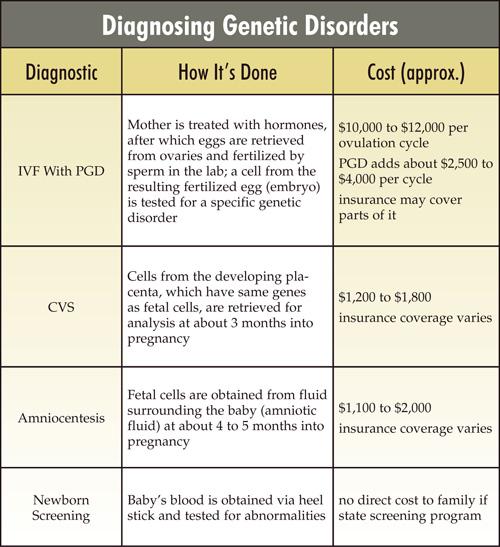Elevated nuchal fold thickness and blood test results often cause a lot of distress but these results are not diagnostic of any condition. The main purpose of amniocentesis is usually to determine whether or not a baby.
 Quest Article The Pain And Promise Of Prenatal And Newborn Genetic Diagnosis Muscular Dystrophy Association
Quest Article The Pain And Promise Of Prenatal And Newborn Genetic Diagnosis Muscular Dystrophy Association
In theory any genetic abnormalities related to those three chromosomal defects will appear in your.

Genetic blood testing pregnancy. These tests are done before pregnancy to help determine if there is a chance a parent will pass down affected genes to their child. Genetic testing can be done to screen for certain birth defects and genetic disorders before or during your pregnancy. If youre pregnant or thinking of getting pregnant genetic testing can give you a closer look into your health and your baby s health.
Genetic testing is when a blood test is given to prospective or expecting parents to look for abnormal genes that can lead to certain diseases in their baby. There are two kinds of tests that can be done in pregnancy. And some defects of the abdomen heart and facial features.
6 With a simple blood test NIPT can noninvasively detect DNA from your baby to determine whether there is an increased or decreased risk of certain genetic conditions. Genetic screening tests are blood tests done usually before pregnancy or in early pregnancy to determine the risk of your baby of inheriting a genetic condition. On the other hand diagnostic tests are done during pregnancy that can identify and confirm any chromosomal anomalies in.
Prenatal genetic screening tests of the pregnant womans blood and findings from ultrasound exams can screen the fetus for aneuploidy. Screening tests can tell you if you are at risk of having a baby with birth defects. Basically you go to your doctors office or local lab and give a sample of your blood.
NIPT is a prenatal screening which looks at DNA from your babys placenta in a sample of your blood to identify whether youre at increased risk of giving birth to a child with a genetic disorder. During pregnancy a womans blood will also contain small fragments of DNA from the baby. The amount of genetic information we can get about the pregnancy from a simple blood draw is expanding rapidly says Michigan Medicine Von Voigtlander Womens Hospital genetic counselor Beth Dugan MS CGC.
The first-line testing in early pregnancy includes an ultrasound to evaluate the thickness of the back of the babys neck and two blood hormone tests. Amniocentesis is a diagnostic test that is performed during the second trimester typically between 15 and 18 weeks of pregnancy but can be performed at any time during a pregnancy. The test which can be done around week 10 of pregnancy can screen for certain chromosomal abnormalities including Down Syndrome trisomy 18 and trisomy 23.
The optional tests which can help detect the risk of abnormalities can supply important information before a babys birth. Carrier screening can be done before or during pregnancy. A noninvasive prenatal screening or NIPS is a blood test that analyzes DNA fragments that are circulating in a womans blood also called cell-free DNA or cfNDA.
If a prenatal screening test indicates the possibility of a problem a prenatal invasive diagnostic test such as CVS or amniocentesis may be performed. Carrier screening the earliest phase of genetic testing for pregnancy is the process of examining saliva or blood tests from prospective parents to indicate if any genetic abnormalities are present in their DNA. A screening like NIPT cannot however determine for sure whether your baby actually has a chromosomal disorder only the likelihood of having that condition.
You or your partner have previously had a baby with a genetic problem. Screening tests are best done in the first 16 weeks of pregnancy and cannot be done after 19 weeks. Some tests can check babies for.
Defects of the brain and spine called neural tube defects NTDs. A baby gender blood test or prenatal screening test helps determine the possibility of a fetus having certain genetic disorders. These tests will not give you definite information about your fetus.
This FAQ focuses on these tests. Some tests can help your healthcare provider confirm or rule out a particular condition whereas others can give your provider more general information.

